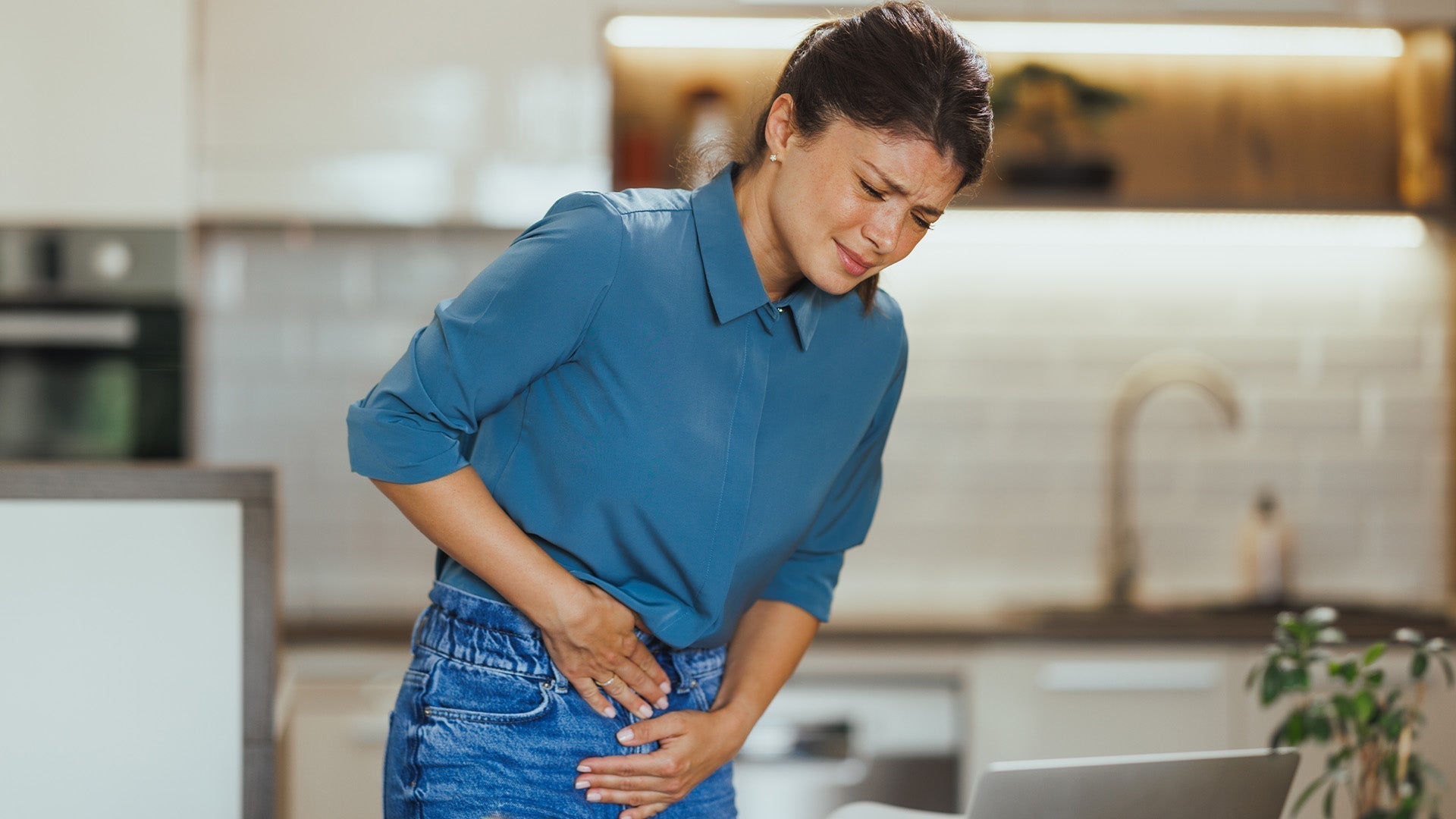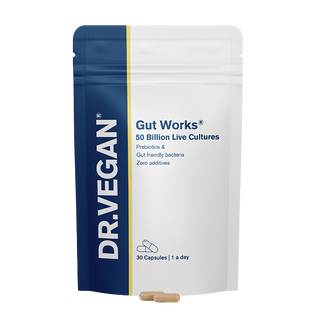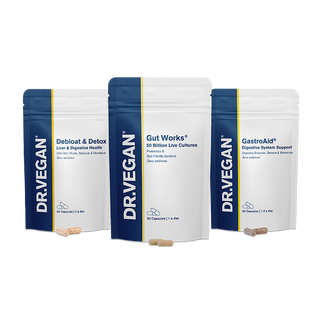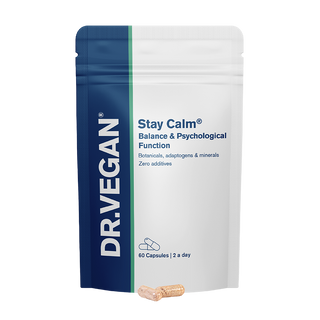Unusual signs of IBS

IBS (Irritable Bowel Syndrome) is a collection of a wide range of symptoms from constipation, diarrhoea and insomnia to heart palpitations, muscle aches and much more. Here, our expert nutritionists explain the unusual symptoms of IBS.
Based on our gut health customer survey, we found that 1 in 4 people suffered from IBS, while more than 4 in 10 people suffered from poor digestion or mild IBS*. Read the latest on IBS symptoms and causes.
How to know if you have IBS
There are five common causes of IBS, including:
- Food sensitivities: In our survey of over 800 people, we found that refined bread, fizzy drinks, alcohol, dairy, and biscuits are some of the biggest triggers of IBS and digestive issues*.
- Insufficient digestive enzymes: If there is a deficiency of any digestive enzymes, specific foods may not get broken down effectively; this can cause gas and bloating.
- Microbiome imbalances: Imbalances in bacteria, yeasts or parasite levels can cause irritation in the gut resulting in gas, bloating, constipation and diarrhoea. Probiotics play an important role in keeping the microbiome balanced. Learn more in 'What are probiotics' and discover the best probiotics for IBS.
- Imbalances in serotonin levels: Serotonin plays many roles in the body, including the normal movement of the gut. If the body has too much, it can cause diarrhoea, and if the body has too little, it can result in constipation.
- Abnormal intestinal movements: This can be caused by abnormalities in the nerve and muscle function of the gut.
Continue reading about the common causes of IBS. You may enjoy 'What does your poo say about your health'.
What is stressed-induced IBS?
In DR.VEGAN's gut health survey, it was found that 66% of people who have poor gut health said their symptoms worsen when anxious.* Stress does not cause IBS directly, but it can trigger or worsen IBS in a number of ways. Stress can disrupt the signals between the gut-brain axis, leading to changes in bowel movements and increased gut sensitivity. Stress can increase intestinal permeability, allowing inflammatory substances to pass through the gut lining and into the bloodstream; this triggers inflammation and can worsen IBS. Stress can cause an imbalance in the gut microbiome, leading to symptoms like bloating, diarrhoea, or constipation. It can also lower the gut's pain threshold, making it more reactive to pain, gas, and bloating; as a result, mild discomfort can feel more severe. Lastly, it can impact the speed of digestion, either slowing it down (resulting in constipation) or speeding it up (resulting in diarrhoea); both are common signs of IBS. Learn more about how to manage stress to prevent an IBS flare-up or discover the '6 signs of an unhealthy gut'.
Unusual symptoms of IBS
While not so common, the following can all be symptoms of IBS related to low levels of serotonin.
Difficulties sleeping and insomnia
Serotonin plays an important role in our sleep as well as our mood and happiness. Our bodies convert serotonin into melatonin, our sleep hormone. The same low levels of serotonin that could trigger IBS could also be involved in sleep difficulties. Cortisol, our stress hormone, is also a common cause of poor sleep. Learn more in 'What is cortisol' and how your diet can help your sleep.
Muscle aches
Another role serotonin plays is in our muscle function, and low levels of serotonin can contribute towards muscle aches. A combination of muscle aches, low moods and sleeping difficulties are commonly related to IBS caused by low serotonin.
Heart palpitations
Low serotonin levels can also trigger anxiety, which can in turn trigger heart palpitations. Heart palpitations are, however, also a symptom of low magnesium; learn more in 'How do I know if I'm deficient in Magnesium'.
Menstruation pain and pain during intercourse
Many women with IBS report a higher level of menstrual pain. This is believed to be due to low serotonin levels because serotonin helps the body to cope with pain, and low levels may increase your feelings of pain. Low-grade inflammation in the colon, as well as bloating and an increased sensitivity of the nerves, can all contribute towards painful or uncomfortable intercourse. Read the latest customer survey into PMS, which shows 65% of women suffer from anxiety and 50% of women feel depressed as a result of PMS symptoms*.
10 worst foods for IBS
Based on our customer survey, the top 10 foods that trigger gut and digestion issues include:
- Refined bread
- Alcohol
- Milk and dairy
- Fizzy drinks
- Biscuits
- Beans
- Onions
- Foods with sweeteners
- Coffee
- Brussel sprouts
Gut Works®

Is there a cure for IBS?
There is no permanent cure for IBS. However, symptoms can often be effectively managed through dietary changes, stress management and lifestyle adjustments. Some people experience long-term relief, but IBS is a chronic condition that may come and go over time.
Can IBS go away on its own?
For some people, IBS symptoms may improve or even disappear over time, especially if triggered by temporary factors like stress, diet, or infections. However, for many, IBS is a lifelong condition that requires ongoing management. The severity and frequency of symptoms vary from person to person.
What happens if you ignore IBS?
If left untreated, IBS can result in other side effects, including nutrient deficiencies that lead to low iron levels and low energy, and low moods, anxiety and depression as a result of low serotonin. IBS can also cause dehydration from excessive diarrhoea and even excessive or rapid weight loss, where you should see your doctor as soon as possible. These symptoms and side effects are all treatable with changes to your diet, improving your gut health, and, where necessary, choosing suitable supplements to relieve IBS symptoms and improve gut health.
What should you do if you think you have IBS?
If you're experiencing persistent common or uncommon symptoms of IBS, you should consult your doctor. If your doctor has eliminated the possibility of any underlying factors, there are a few self-help tips to help treat IBS.
Identify and remove food intolerances: The first step to do this is by keeping a food diary and trying the 'Elimination Diet' to identify foods that your body doesn’t agree with. Learn more about the best foods for IBS.
Replace digestive enzymes: Try taking a probiotic or digestive enzymes to help support your gut and digestion. You may be interested in our Ultimate Gut Health Bundle which includes: Gut Works®, an award-winning supplement, with 6 scientifically studied strains and 50bn healthy bacteria, provides daily support for your gut microbiome. Debloat & Detox, a unique formula of botanicals and amino acids for digestive-related bloating and supporting detoxification of your liver. It contains botanicals that can stimulate the production of digestive juices, which then support the digestion and breakdown of foods. Plus, GastroAid which is an advanced formula containing betaine hydrochloride, digestive enzymes and botanicals to support the proper breakdown of food in the stomach.
Identify and resolve imbalances in the microbiome: This may require a test to identify what is going on in the gut. There are simple things that you can do to support your microbiome. For example, increase the level of fibre in your diet and avoid sugar and refined foods.
Optimise nutrient intake: Taking additional supplementation and eating a nutritious and balanced diet can really help with symptoms.
Paquete de Salud Intestinal

Discover our range of award-winning vegan probiotics, vitamins and supplements
*Based on a UK survey conducted by DR.VEGAN® of 246 customers, nationally representative, during August & September 2022. All customer survey findings reflect our own efforts and have not been influenced or verified by any external organisations or third-party entities.
You may also enjoy reading:
- Acid reflux? Best 3 foods to eat and avoid
- Signs of gluten intolerance
- 5 common myths of coeliac disease
- What is period poo?
**This article contains data from UK surveys conducted by DR.VEGAN®. All survey findings reflect our own research efforts and have not been influenced or verified by any external organisations or third-party entities.

















